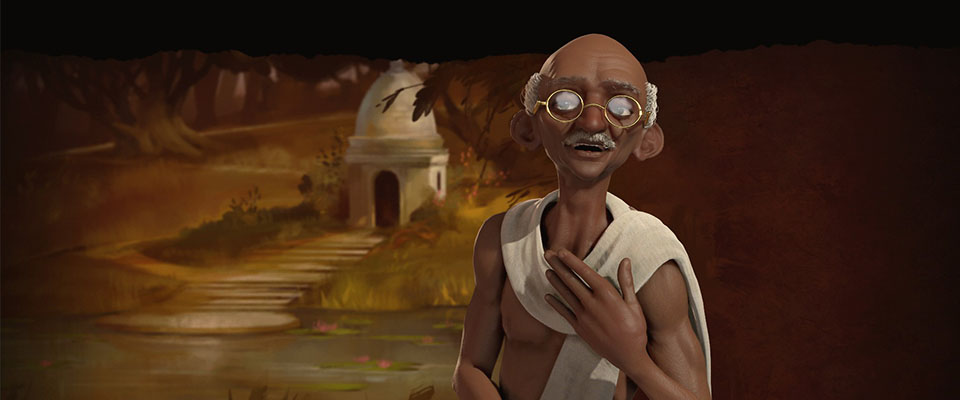Since the emergence of humans as a species, mankind has banded together in societies on a voyage of discovery. From the early days of the Bronze Age where tribes hunted animals and gathered fruit, to the globalised community we have today. It’s not been easy and there are many rifts still unhealed in the world, yet many great things have been invented that would make our ancestors see us as gods.
It’s this very journey that is simulated in all the Civilization games. Time and time again it has proven that entire evenings can be wiped out in an instant. Civilization VI however does something that’s not been done for a long time; it has proven that the base game alone is worth sinking countless hours into without the need for an expansion to flesh out the gameplay.
Much like every other Civilization game, your task is to outmanoeuvre the other countries to achieve one of the five victories on offer. To do that you must build up your own people in such a way that you can not only progress towards your chosen goal, but also fend off against your opponents and barbarians long enough to achieve it. Alliances can be forged, wars break out; it’s pretty much the same deal in Civilization VI as in most expanded Civ games.
Except there have been major revisions. Districts are essentially the evolution of how cities work, spacing out each improvement to the surrounding tiles. This adds a layer of complexity that is so brilliant, it’s a wonder that Firaxis hadn’t thought of it before. Wonders also take up their own tile, so each one is finally detailed as its own building, instead of being bundled into a city.
The once intimidating Tech Tree has now been split into two. The Tech Tree is reserved for inventions, while the Civics Tree allows for the creation of new government styles, policies that are deployed in card form, and some new buildings. As such, the way you build up towns and advance your civilisation is a much more involved and ultimately rewarding experience.
Managing units in previous Civilization games has either been a case of wielding a large number of vulnerable units or one giant horde of death. Civilization VI takes an approach where you can combine certain units together, such as Settlers with a Warrior escort to protect them, or ships with a Great Admiral granting them a bonus. It’s a great addition that doesn’t feel too imbalanced.

All of this can be learned in a tutorial that sees the player take on either the role of Cleopatra or Gilgamesh. Though you can just jump straight in the main game and get little hints and tips as you play, if you’re a novice or just new to Civilization VI, the tutorial is well done and gets the main points across nicely.
As far as the civilisations themselves are concerned, there’s a lot of variety throughout the 19 civilisations available at launch; Montezuma has a preorder exclusivity window but will eventually be free for everyone, making the total 20. Some are focused on a particular type of warfare, getting bonuses and unique units for certain terrain, while others get bonuses to culture and religion.
The avatars that represent them have great expressive faces to their charming caricatures. Generally they have a behaviour set that governs how their AI will react, but they are prone to moments of madness, such as declaring war on a whim when your army vastly outclasses theirs. Then again it’s not Civilization without Gandhi showing himself to be a bloodthirsty warmonger!
Speaking of the presentation, there’s something quite special about just how clean Civilization VI looks despite the amount of things on screen. Even in the late game I had no issues looking for my units, managing my cities, and surveying the terrain for more resources. The user interface is packed with options too, but never feels cluttered enough to lose any of the buttons.

Music is also a highlight. The main theme, “Sogno di Volare” is an appropriately epic number that works wonderfully, even though Civilization IV’s “Babu Yetu” can never be topped. In-game music evolves each nation’s theme as the game progresses to become more epic as you advance through the ages. It’s enchanting and only after the 50th hour gets annoying. As for Sean Bean’s narration, it’s nice to hear him read quotes throughout, especially the J.R.R Tolkien one.
As if there isn’t enough replay value with the civilisations at launch, there are a few scenarios that can be played that simulate different periods of our real history. Do you modify the setting to reflect the Cold War, or build on religious superiority in time for the industrial age? They’re great scenarios, though I’d like to see more ways to modify the game in the future.
What’s Good:
- New mechanics make sense and are well taught by the tutorials
- Districts are a game changer for the better
- Same addictive gameplay
- Clean and appealing visuals accompanied by great music
- Vast amount of Civilisations to play as
What’s Bad:
- A few instances of AI idiocy.
Civilization VI is my new favourite addiction that I honestly can’t really fault. Each of the gameplay changes provides a fresh challenge, but they were well worth undertaking once they clicked. It’s packed full of the stuff that made the previous games great, but also has a crisp style that makes things clear enough when the game gets extremely busy. As such, the vanilla version of Civilization VI is so good, expansions aren’t really necessary to improve upon it. Having said that, I’m excited for what’s next.
Score: 10/10

